Faced with Tragedy: Navigating Life After Loss
Anat Meir's life took a dramatic turn on Simchat Torah when her husband David was killed in war shortly before his father's passing. How does she find strength amid the turmoil, and how does she hope her young son will remember his father?
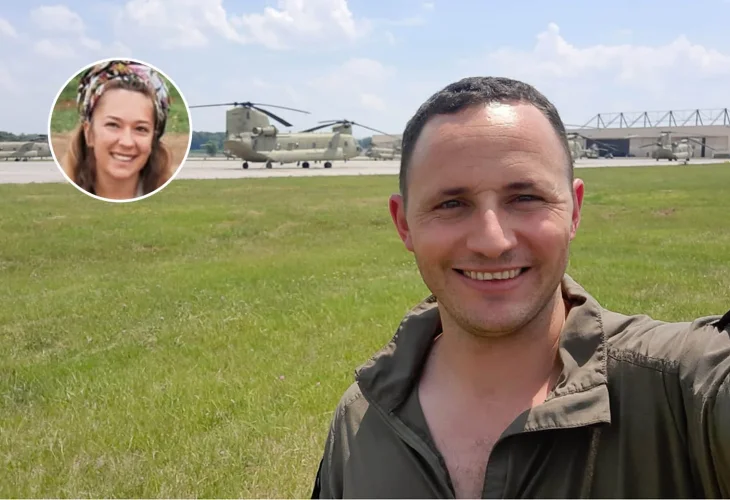 David Meir, of blessed memory. Inset: Anat Meir
David Meir, of blessed memory. Inset: Anat Meir"People often ask how I feel one year after my husband was killed in battle, and I respond with: 'Has it really been a year?'" says Anat Meir, pausing—as if to digest the passage of time.
It's been 12 months since her husband David fell in the battle over Be'eri on Simchat Torah. She reflects on reality with unfiltered clarity: "I can't explain this to anyone who hasn't experienced it, but in a way, I've been living in a surreal, fictional world since it happened. I think many can relate to this feeling these days."
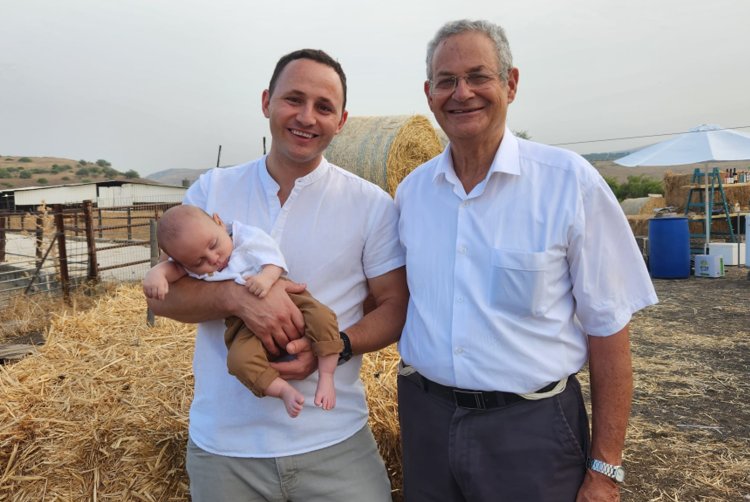 With late father Yair
With late father Yair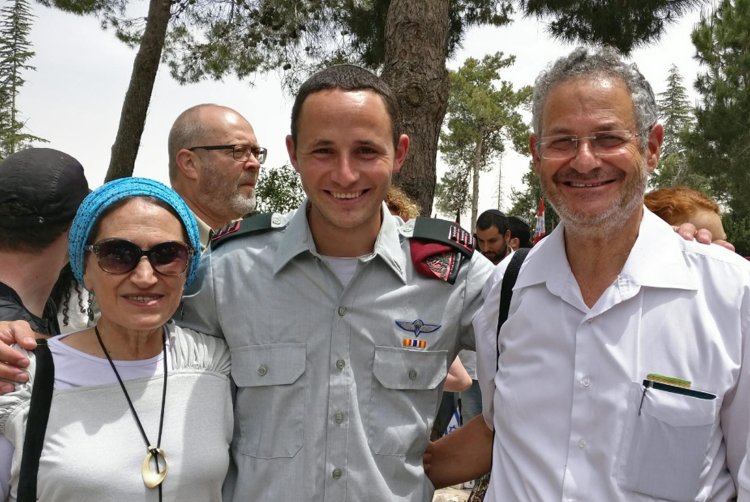
A Man of Love
Anat and David met just three and a half years ago, were married for two, and together they welcomed a sweet and smiling baby boy named Shaked into the world. "David managed to achieve so much in his life," Anat shares. "He worked in real estate, was on the brink of starting his own business, and was an exemplary father and an amazing family man. But I think what defined him most of all was his love for people. He loved helping anyone with anything and cherished the land, whether through hiking or singing Israeli folk songs.
"David had a knack for noticing the tiniest details and needs, from taking out the trash at friends' houses to offering help to someone on the street. In our neighborhood WhatsApp group, everyone knew he would be among the first to offer assistance."
Does Shaked remember his dad?
"He was only seven months old then, too young for memories. Yet I believe some impressions linger. David had those precious seven months with him, showing an extreme level of closeness. From the moment Shaked was born, David overflowed with love, exuding happiness as he showered Shaked with hugs and kisses. That profound love leaves its mark on the soul."
What do you want Shaked to remember about his father?
"It’s challenging to grow in the shadow of such a heroic story. David gave his life for Israel. While I want Shaked to know this story, it's just as important to know his father as a person, with all his qualities and even his flaws. My mission is to create a complete, if imperfect, image for him."
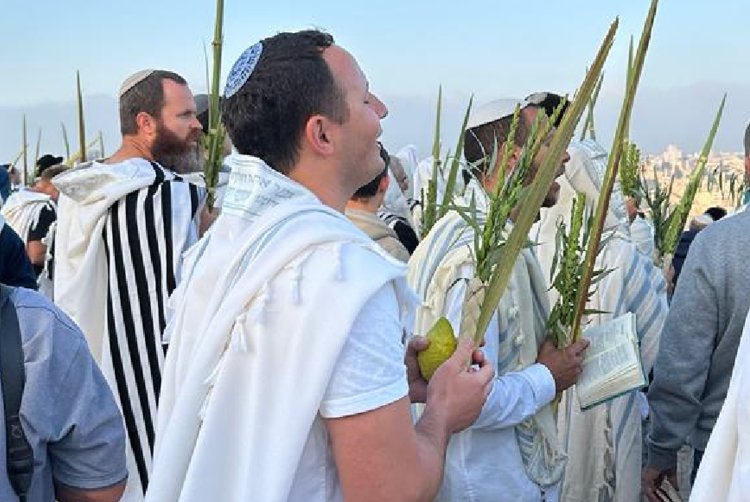 David Meir, praying at dawn on the Mount of Olives on Hoshana Rabbah, one day before departing for battle
David Meir, praying at dawn on the Mount of Olives on Hoshana Rabbah, one day before departing for battle"Fought Until the Last Moment"
Take us back to Simchat Torah. What happened that day?
"Simchat Torah followed a full week of Sukkot festivities. We chose to stay home that day. The night before, David danced with Shaked in the synagogue before our holiday meal with friends. We woke up late the next morning, and as David got ready for synagogue, the phone rang. Once he realized there was trouble, he quickly packed a bag and was out the door in five minutes.
"By noon, David joined his unit heading south, reaching the outskirts of Kfar Aza to help evacuate the wounded. Driven by purpose, he contested his commanding officer, insisting: 'People are dying, we need to save them, let’s get in!' Though two army battalions were already inside, they weren’t allowed to join. Instead, they entered Kibbutz Be’eri and fought for hours within it."
Anat pauses before sharing the tragic part of the story. "Towards evening, during a battle at Be’eri, David and others tried to secure a building when suddenly, they were fired upon from a window. The men threw themselves to the ground, crawling under a structure for safety. A fierce 40-minute rescue ensued, their friends trying to evacuate them amidst heavy fire, two of whom were injured. David and a fellow soldier held onto each other beneath the structure, sustaining severe injuries. David was fatally wounded, despite his physical and mental resilience. He understood these were his final moments and requested his comrade: 'Tell my wife I love her and our child, and that I’m sorry'.
"Only after 40 intense minutes did rescuers manage to extract David and provide medical aid before airlifting him. He had lost consciousness, and by 8:45 PM at Soroka, he was pronounced dead. His comrade was injured but less seriously. I learned all the details from him; he told me everything."
What was happening with you at that time?
"After David left, I joined a friend whose husband was also called up. Without a secure room, we stayed with our parents. Packing a small bag for me and Shaked, I left home for what would be the last time. I returned only to pack; I've not lived there since."
Anat mentions that throughout the day, she wasn’t worried about David because by 6 PM, he’d replied to her message saying he was fine. "I was relatively calm, thinking the fighting must have subsided. But as hours passed without contact, anxiety grew and by Saturday night, I was in a full panic. Incapable of functioning, the worst never crossed my mind. I expected David would reunite with his unit and contact me."
"By Sunday at 12:30 AM, still uncertain, I received a call from his commander saying David was critically wounded but airlifted and in the country. Frantic, we called every hospital, while David’s father went to Soroka to seek updates. We believed he was among 'unknown' wounded patients. Hours later, David’s father called after an army officer informed him of David’s passing. Thus, we received the devastating news via phone."
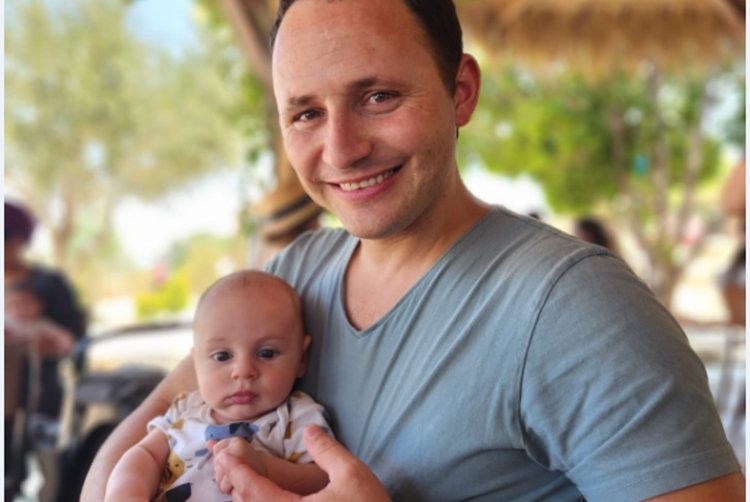
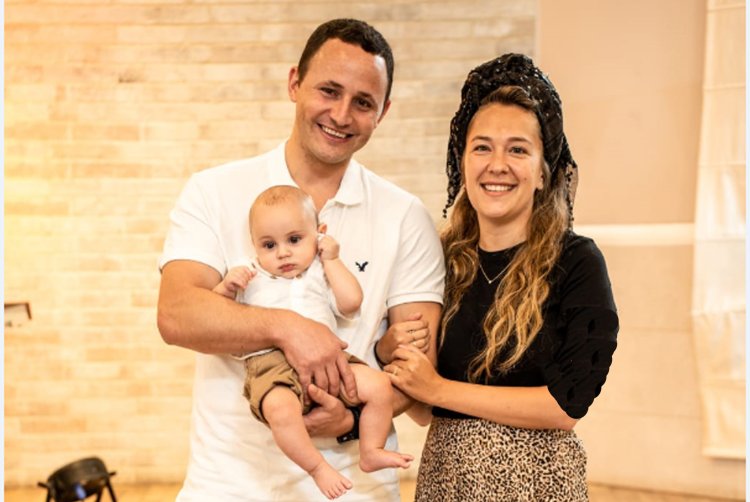
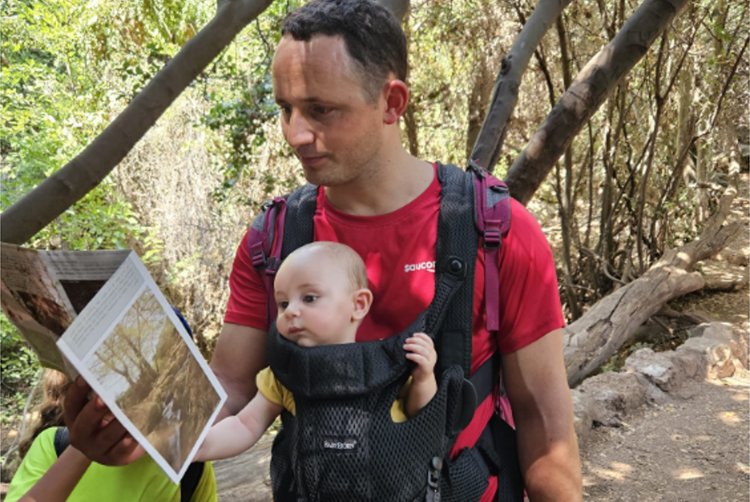
Gratitude in Grief
A year has passed since that life-altering day. "Part of me can't believe it’s only been a year; it feels like much longer," Anat says. "Yet part of me thinks if David walked through the door now, it wouldn’t seem strange. I haven’t fully processed it, partly because I share in the national grief. It adds a layer of tragedy but also a form of support. Personally, I'm part of a large group of widows who help me cope."
Have you been able to return to any routine?
"I haven't restarted any routine. My encounter with death transformed my life. All my comfort zones crumbled—I left our apartment, began a leave from work, and now consider leaving my job altogether. My schedule fills with events—from widow gatherings and speaking engagements about David to managing endless bureaucratic tasks and caring for our sweet child. My life is full, which in a way is good. Of course, I strive for balance, ensuring time for my grief—not to evade it through busyness but to give space to personal pain."
Does your faith help in your daily struggle?
"Had you asked before all this, I’d have said the loss of David would sever my bond with Hashem. Losing him was my greatest fear. Even short trips would send me into tears. But after everything happened, I found my connection with Hashem actually strengthened. My faith has now reached a new depth, making survival possible, as it provides solace and strength to continue.
"This core belief, the understanding that such events aren’t random, but purposeful...it’s a feeling of once thinking you understood life, only to realize you hadn’t begun to grasp it."
Anat pauses and adds: "Regrettably, Yair—David’s father—passed away three months after David. Yair, a man of action, couldn’t endure the loss despite engaging tirelessly in good deeds, avoiding the label of a 'bereaved father'. He once told me: 'One must recognize the grace around them,' a mantra I’ve adopted. Despite our hardships since Simchat Torah, grace exists amidst anguish: knowing David’s final moments, hearing his last words, understanding he was protected with familiar faces, alive and well. Our turmoil was brief compared to others. I’m blessed with my wonderful families—David’s and my own—who support me continually, and the incredible, indescribable strength of the Jewish people worldwide. These are blessings to acknowledge, even in our profound grief."

